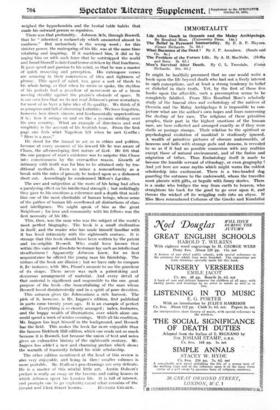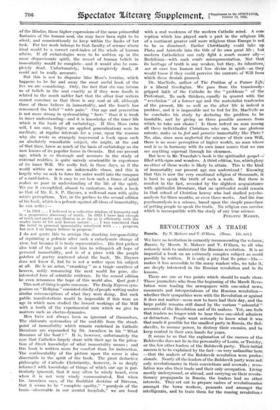IMMORTALITY
The Belief in. Personal Immortality. By E. S. P. Haynes. (Grant Richards. 7s. 6d.)' IT might be healthily presumed that no one would write a book upon the life beyond death who had not a lively interest in Rich conceptions, and, at least a strong tendency to belief or disbelief in their truth. Yet, by the first of these five books upon the after-life, such a presumption seems to be completely falsified. From Miss Rosalind Moss's scholarly study of the funeral rites and eschatology of the natives of Oceania and the Malay Archipelago it is impossible to con- jecture what are the author's own hopes and fears concerning the destiny of her race. The religions of these primitive peoples, their part in the highest emotions of the human race, are here collected and arranged exactly as if they were shells or postage stamps. Their relation to the spiritual or psychological evolution of mankind is studiously ignored. A wealth of primitive pictures of obscure underworlds, of heavens and hells with strange gods and demons, is revealed to us as if it had no possible connexion with any realities except those of natural environment, and of the fusion and migration of tribes. Thus Eschatology itself is made to become the humble servant of ethnology, or even geography ! And yet here are some myths which might warm the coldest scholarship into excitement. There is a two-headed dog guarding the entrance to the underworld, whom the traveller must placate with gifts, or beguile with funny stories. There; is a snake who bridges the way from earth to heaven, who straightens his back for the good to go over upon it, and throws the wicked off its wriggling coils into an abyss. If Miss Moss remembered Cerberus of the Greeks and Kundalini
of the Hindus, those higher expressions of the same primordial fantasies of the human soul, she may have been right to be silent, and conscientiously to keep within the limits of her task. For her work belongs to that faculty of science whose ideal would be a correct card-index of the whole of human affairs. If all eschatologies were to be written up in the same dispassionate spirit, the record of human beliefs in immortality would be complete—and it would also he com- pletely dead. Unfortunately, being completely dead, it could not be really accurate.
But this is not to dispraise Miss Moss's treatise, which happens to be far and away the most useful book of the five we are considering. Only, the fact that she can inform us of beliefs in the soul exactly as if they were fossils is related to the much sadder fact that the other four writers cannot convince us that there is any soul at all, although three of them believe in immortality, and the fourth has renounced the belief " with pain." Our age and generation is not more strong in systematizing " facts " than it is weak in inner understanding—and it is knowledge of the inner life which is the basis of all eschatology. If Miss Moss (who will, I am sure, forgive an applied generalization) were to meditate, at regular intervals for a year, upon the reasons why she wrote so strangely impersonal a book upon such an absolutely remarkable subject, she might, at the end of that time, know as much of the basis of eschatology as she now knows of its popular forms in Oceania. But our present age, which is so thorough and accurate in the study of external realities, is quite naively unscientific in experience of its inner Will. We really feel, in these days, as if the world within us were an unknowable chaos, and this is largely why we seek to force the outer world into the compass of a card-index. It is easy to see how such a frame of mind makes us poor in understanding of the life of the spirit. We sec it exemplified, almost to caricature, in such a book as that of Mr. E. S. P. Haynes, a well-read man with quite astute perceptions. Yet, in the preface to the second edition of his book, which is a polemic against all ideas of immortality, he can write :--
" In 1913 . . . I believed in a collective wisdom of humanity and in a progressive discovery of truth. In 1925 I have had enough of truth and prefer any illusion in so far as it efficiently veils the cruder facts of life and human nature . . . I was convinced that the belief in personal immortality interfered with . . . progress, but now I no longer believe in progress."
I do not quote this to arraign the shocking irresponsibility of reprinting a polemic after such a cataclysmic change of view, but because it is truly representative. His first preface also told of the pain it cost him to relinquish all hope of personal immortality, and is of a piece with the purple patches of poetry scattered about the book. Mr. Haynes does not know it, but he is not a writer upon his subject at all. He is an actor, "swanking" as a tragic sacrificer of heaven, nobly renouncing the next world for pure, dis-
interested love of scientific evidence. In the second edition he even renounces the hope of this world also. Quel geste ! This sort of thing is quite common. The Daily Express sym- posium on " Religion" consisted chiefly of people writing under
similar misconceptions of what they were doing. But such public manifestations would be impossible if this were an age in which men studied the inward workings of the Will with a tenth of the experimental care which we give to matters such as electro-dynamics.
Men have not always been so ignorant of themselves. The elaborate systematics of the soul-life from the stand- point of immortality which remain enshrined in Catholic literature are expounded by Dr. Arendzen in his " What Becomes of the Soul ? " It is, however, unfortunately the case that Catholics largely share with their age in the priva- tion of direct knowledge of what immortality means ; and this book is written more for comfort than for instruction. The sentimentality of the picture upon the cover is also discernible in the spirit of the book. The great deductive philosophy of Catholic Christianity, however, is so deeply informed with knowledge of things of which our age is par- ticularly ignorant, that it may often be wisely heard, even when it is not very wisely communicated. But when Dr. Arendzen says, of the Buddhist doctrine of Nirvana, that it seems to be " complete apathy," " paralysis of the brain—observable in our mental hospitals," we are faced
with a real weakness of the modern Catholic mind. A con- ception which has played such a part in the religious life, of a continent greater and more religious than Europe is not to be so dismissed. Earlier Christianity could take up Plato and Aristotle into the tide of its own great life ; but modern Catholicism can only fight a much nearer ally- Buddhism—with such crude misrepresentation. Not that its heritage of truth is any weaker, but they, its inheritors,i are at once less human and less divine in spirit—as they would know if they could perceive the currents of Will from which these denials proceed. Dr. MacNeile, author of The Problem of a Future Life,' is a liberal theologian. We pass from the tenaciously-, gripped faith of the Catholic to the " problems " of the Protestant. To such thinkers, equally in quarrel with the " revelation " of a former age and the materialist tendencies of the present, life as well as the after life is indeed af problem, and it is impossible not to feel for Dr. MacNeile as he concludes his study by declaring the problem to be insoluble, and by giving us three possible answers from which to take our choice ! Is there indeed no man among all these individualist Christians who can, for one glorious minute, make us to feel and perceive immortality like Plato ? No, alas, since men neglected the science of their own Will,, there is no more perception of higher worlds, no man whose, soul is so in harmony with its own inner source that we can see anything supernal through his clearness.
But here in Mr. Tweedale's book is the spiritualist gospel—' filled with signs and wonders.. A third edition, too, which glory no other of these works is likely to attain. This is the kind of immortality our present age can understand ! Knowing that this is now the very emotional religion of thousands, it is hard to speak the truth of such a work. But there is comfort in the fact, revealed by the slightest acquaintance with spiritualist literature, that no spiritualist could remain in that school of Christian heresy who had studied psycho- analysis for three months, or even three weeks. And the true psychoanalysis is a science, based upon the simple procedure of getting people to speak the truth. No religion can survive which is incompatible with the study of any true science.
PHILIPPE MAIRET.































































 Previous page
Previous page